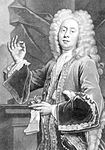The Royalist is a 1682 comedy play by the English writer Thomas D'Urfey. It was staged at the Dorset Garden Theatre by the Duke's Company, shortly before the merger that created the United Company. It is set during the Commonwealth Era following the English Civil War.

The Squire of Alsatia is a 1688 comedy play by the English writer Thomas Shadwell. Alsatia was a nickname for the Whitefriars area of London, deriving from Alsace in northeastern France. A restoration comedy, it was performed at the Drury Lane Theatre by the United Company following on from John Crowne's Darius, King of Persia. One of the best-remembered roles, that of the shrewish Mrs. Termagant was first performed by Elizabeth Boutell. It was revived numerous times during the eighteenth century.
Regulus is a 1692 tragedy by the English writer John Crowne. It portrays the career of Marcus Atilius Regulus, a Roman Consul at the time of the First Punic War. A separate play of the same title was written by William Havard in 1744.
Darius, King of Persia is a 1688 tragedy by the English writer John Crowne. It portrays the reign of Darius III of Persian Empire, focusing on his defeat by Alexander the Great and subsequent death.
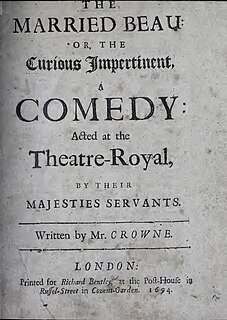
The Married Beau or The Curious Impertinent is a 1694 comedy play by the English writer John Crowne. It is inspired by a passage from Miguel de Cervantes's Don Quixote. Incidental music was composed by Henry Purcell.
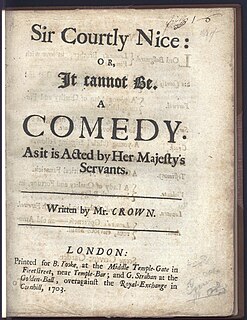
Sir Courtly Nice: Or, It Cannot Be is a 1685 comedy play by the English writer John Crowne. Rehearsals by the United Company were underway when the death of Charles II in February led to the closure of all theatres as a mark of respect. The play was eventually staged on 9 May at the Theatre Royal, Drury Lane. It is the tradition of the Restoration Comedy. A popular hit it became a stock part of the repertoire for more than a century, with Colley Cibber and Anne Oldfield appearing in a celebrated 1709 revival.
The Country Wit is a 1676 comedy play by the English writer John Crowne, part of the tradition of Restoration Comedy. It was first staged at the Dorset Garden Theatre in London by the Duke's Company. The cast included Samuel Sandford as Sir Thomas Rash, Thomas Betterton as Ramble, James Nokes as Sir Mannerly Shallow, Henry Harris as Merry, Cave Underhill as Booby, Matthew Medbourne as Lord Drybone, Anthony Leigh as Rash, Mary Betterton as Lady Faddle, Mary Lee as Christina, Elizabeth Currer as Betty Frisque and Elinor Leigh as Isabella.

Dame Dobson is a 1683 comedy play by the English writer Edward Ravenscroft.
Charles VIII of France also known by the longer title The History Of Charles The Eighth Of France; Or, The Invasion Of Naples Of The French is a 1671 tragedy by the English writer John Crowne. It is based on the reign of Charles VIII of France and particularly his Italian War of the 1490s.
Thomas Percival or Percivall was an English stage actor of the seventeenth century. He was a member of the Duke's Company from 1671 to 1682 and then the merged United Company until 1686. Throughout his career he was confined to playing supporting roles, never graduating to major parts. He was the father of the actress Susanna Verbruggen. In 1693, following his retirement from the stage, he was arrested for coin clipping, a capital crime, for which he was sentenced to hang at Tyburn. The intercession of his daughter with Mary II saw his sentence commuted to transportation, but before he reached Portsmouth he died of natural causes.
Elizabeth Bowman was an English stage actor of the seventeenth and early eighteenth century. The daughter of Sir Francis Watson, 1st Baronet she was adopted by the actor manager Thomas Betterton. In 1692 she married John Bowman and began acting at Drury Lane the following year as Mrs Bowman. She was a member of the United Company until 1695 then joined Betterton's breakaway at the Lincoln's Inn Fields Theatre.
Juliana; Or, The Princess Of Poland is a 1671 tragedy by the English writer John Crowne. It was originally staged by the Duke's Company at the Lincoln's Inn Fields Theatre in London.
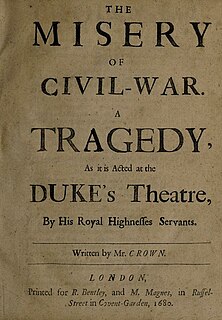
The Misery of Civil War is a 1680 tragedy by the English writer John Crowne. It was originally staged by the Duke's Company at the Dorset Garden Theatre in London. The play was staged at the height of the Popish Plot, something Crowne addressed in his prologue. Although he states that "by his feeble skill 'tis built alone, The Divine Shakespeare did not lay one Stone" the plot in fact drew heavily on Henry VI, Part 2 and Part 3
The English Frier; Or, The Town Sparks, sometimes spelt as The English Friar, is a 1690 comedy play by the English writer John Crowne. It was originally staged by the United Company most likely at the Theatre Royal, Drury Lane, although it may have appeared at the Dorset Garden Theatre, the other venue of the company. Written in context of the recent Glorious Revolution, it attacks Catholic priests who meddle in English politics, undermining the constitution.

Love Triumphant; Or, Nature Will Prevail is a 1694 tragicomedy by the English writer John Dryden. It was Dryden's final stage play.
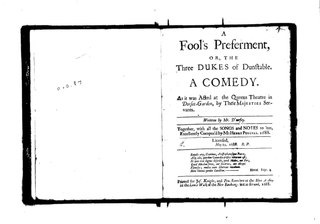
A Fool's Preferment; Or, The Three Dukes Of Dunstable is a 1688 comedy play by the English writer Thomas D'Urfey. It is a reworking of John Fletcher's Jacobean work The Noble Gentleman. It was first performed by the United Company at the Dorset Garden Theatre in London. Henry Purcell composed the play's incidental music. It was his first major work composingfor the theatre in seven years since Sir Barnaby Whigg.
The Ambitious Statesman; Or, The Loyal Favourite is a 1679 tragedy by the English writer John Crowne. It was originally staged by the King's Company at the Theatre Royal, Drury Lane in London. The original cast is unknown except for Joseph Haines who played La Marre, and also spoke the epilogue.
Thyestes, A Tragedy is a 1680 tragedy by the English writer John Crowne. It was originally staged by the King's Company at the Theatre Royal, Drury Lane. The original cast is unknown. It is based on Thyestes by Seneca.
Charlotte Butler was an English stage actress and singer of the seventeenth century. She may have joined the Duke's Company in the 1670s, but her first definite recorded performance was in Aphra Behn's The Revenge (1680)
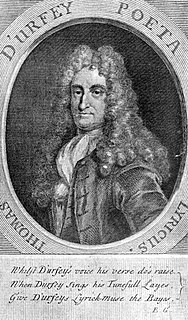
The Campaigners; Or, The Pleasant Adventures At Brussels is a 1698 comedy play by the English writer Thomas D'Urfey. It was first staged at the Theatre Royal, Drury Lane by Christopher Rich's Company.









